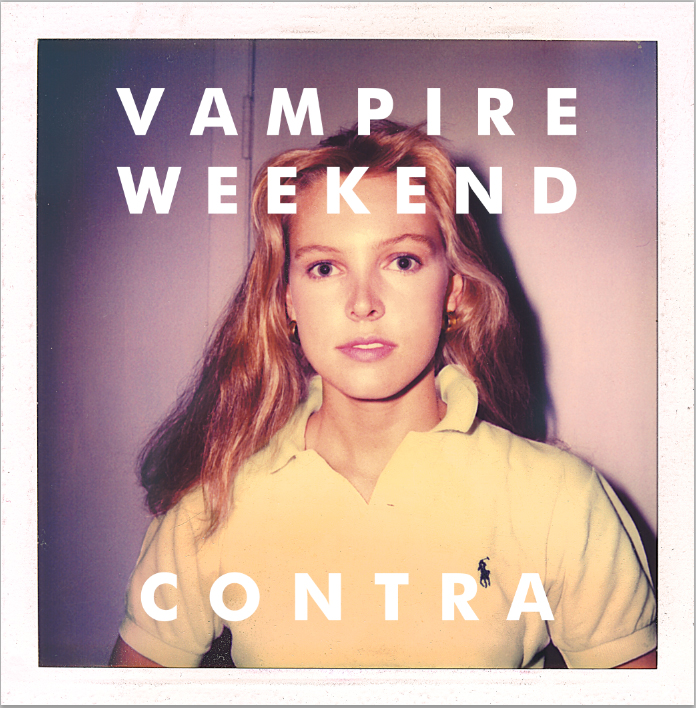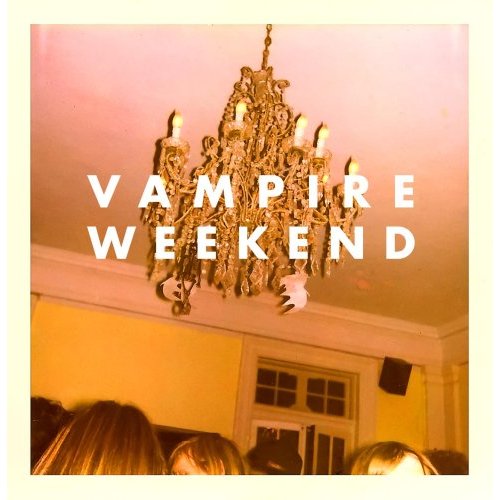
Out today on XL Recordings. Now playing on Phawker Radio!
SIMON REYNOLDS: Already I hear the naysayers bleating, “Something New?! But they’re so derivative!” (This, from Deerhunter fans.) No new instruments have been invented, it’s true, and here and there on Vampire Weekend, you’ll pick up a faint scent of things you might have heard before: a bounce of Beat in “A-Punk,” Orange Juice’s just-brushed sheen, Monochrome Set’s suave wit. The most common reference point (apart from Graceland, which seemingly crops up because it’s the sole example of African-influenced rock most people know) is early Talking Heads. And that’s a telling comparison, not because VW sound like them—they don’t—but because of the crisp, clutterless clarity of the sound, a transparency of structure that allows you to see both the perfection and the unorthodoxy of the way the songs move and build. Unfugged by nu-shoegaze haze, the equality between the instruments shines through—the bass, the keyboards, the guitar, and the drums all take turns as the star.
But where the Talking Heads comparison really fits is the identical set of accusations hurled at both bands: politeness, calculation, detachment, neatness. (In its charticle survey of 2008, New York magazine placed Vampire under “Despicable” for “further digging rock and roll’s grave” by appearing on SNL in sweaters!) Those insults are predicated on the positing of a subversive power to rudeness, spontaneity, wildness, and mess—a too-easy equation shaky even in Byrne & Co.‘s day and now fully crumbled (although you can find its pantomime enacted still at Wolf Eyes or Monotonix shows). Given the nature of  modern media and our crazed archival culture, it’s obvious that no halfway sentient band can come into being without premeditation, the meticulous marshalling and coordination of influences and reference points. Knowingness irretrievably entered the water table long ago, and Vampire Weekend simply take this foundation of modern music—the impossibility of not overthinking things, of not riddling your work with footnotes and hyperlinks—and push through to full-blown conceptualism. They began with a handful of ideas (including the occasional convergence of Johnny Marr‘s playing in the Smiths with African guitar pop, along with an impulse to investigate the preppy aesthetic) and proceeded to assemble a tour de force amalgam of form and content. MORE
modern media and our crazed archival culture, it’s obvious that no halfway sentient band can come into being without premeditation, the meticulous marshalling and coordination of influences and reference points. Knowingness irretrievably entered the water table long ago, and Vampire Weekend simply take this foundation of modern music—the impossibility of not overthinking things, of not riddling your work with footnotes and hyperlinks—and push through to full-blown conceptualism. They began with a handful of ideas (including the occasional convergence of Johnny Marr‘s playing in the Smiths with African guitar pop, along with an impulse to investigate the preppy aesthetic) and proceeded to assemble a tour de force amalgam of form and content. MORE
CONTRA SONG-BY-SONG NOTES
HORCHATA
“It opens with a harmonium drone like you might find in Bollywood music, Ezra’s voice comes in with a kind of Buddy Holly echo, he’s doubled by a Kalimba thumb piano, which is intertwined with his vocal melody –there’s actually a few melodies going on at once– and a subby bass drum thumping, and then suddenly you get a deep house synth and a mass of our voices: me and Ezra and some womens’ voices as well. And they’re all soaked in this classic 80’s reverb. One of the goal’s for this record was to use vocals as a texture, as an instrument.” – Rostam Batmanglij
WHITE SKY
This song has already been a live favorite for a while. Vampire Weekend first played it at the release party for their first album in January 2008. It’s inspired by some of the same African vibes and rhythms that influenced the debut, but the finished product represents a new chapter in the band’s sound.
“This song picks up where M79 left off. Similar people, similar geography, but, I think, a more developed sense of purpose.” –Ezra Koenig
HOLIDAY
For “Holiday,” the band took inspiration from third wave-ska bands like Operation Ivy, but also reflects their exploration of new guitar tones and rhythms.
“The inspiration for the bridge was a family member who stopped eating meat after the US invaded Iraq – not as a protest per se, more of a visceral reaction.” – Ezra
CALIFORNIA ENGLISH
Despite being one of the shortest songs on the album, there’s a lot crammed into California English’s 2 minutes and 27 seconds. It’s lyrical density has more in common with Lil’ Wayne than Indie Rock. It has heaviness not found on the first album but also retains a breezy, almost calypso vibe.
On using autotune in this song: “It doesn’t sound like T-Pain,” Ezra says. “There’s plenty of amazing music from around the world using AutoTune besides American pop.”
TAXI CAB
It’s a ballad but the up-close vocals sit on top of huge, dubby drums and dancehall synths, while haunting, classical pianos and harpsichords move in and out. Featuring the upright bass playing of Nat Baldwin.
“I’ve always liked this Joe Strummer quote about how the topic of love has been sufficiently covered in pop music. I think he was right, so if I’m going to sing about relationships I want to use it as stepping stone to get at more elusive topics too.” –Ezra
RUN
Filled with Miami Sound Machine-style trumpets, sliding bass and massive, gated snare drums, Run propels the listener into the second half of the LP.
“On this song, I experimented with certain rhythms that I avoided on the first record. I like how this song alternates between heavy, Rock-like choruses and reggaeton verses.” – Christopher Tomson
COUSINS
Recorded in Mexico City, this song breaks new ground for the band without any radical shifts in instrumentation. With Chris Tomson’s Wipeout-style rolls and Chris Baio’s frenetic, punky bassline, Cousins is a powerful rhythm section showcase.
“With this song, I wanted to make something that was fierce and thrashy but also smooth and elastic. I think it’s our heaviest song.” – Chris Baio
GIVING UP THE GUN
It exists in some sort of nexus between baile funk, stadium rock and house. It’s one of the most ambitious songs on the album and would sound as equally at home on a dancefloor as in a Comp-Lit grad student’s Zune™. Seriously though, it’s a banger and through its mix of congas, claves and 808 claps, Vampire Weekend continues the first album’s exploration of rhythmic connections while advancing the discussion.
“On this song, we wanted to get across some big feelings, but still keep a sense of minimalism. I think we found a way to do that, musically and lyrically.” – Ezra
DIPLOMAT’S SON
A lyrical collaboration between Rostam and Ezra. VW’s longest song. Dancehall. Reggae. Bollywood. West African Guitar music. It’s a little prog-y. It features a percussive vocal sample from M.I.A.’s “Hussel” and an interpolation of “Pressure Drop” by the Toots and the Maytals.
“I started making this song in my living room. At one point my roommate walked in and turned on the kitchen faucet, you can hear it running behind the guitar solo.” – Rostam
I THINK UR A CONTRA
“This is the first Vampire Weekend song with acoustic guitar. At one point I wanted to rent a Kora to play the parts I was hearing in my head for the end. Even though this song is dark it ends in a place that’s celebratory and cathartic. I used an 8-bit keyboard from the 80’s to sample my own voice to create a bed of vocals. It ended up like a dirty, shaky Kate Bush, This Woman’s Work. The harmonies on this song are not like anything you’d find on our first record. I wanted the bridge to sound Americana.” – Rostam
